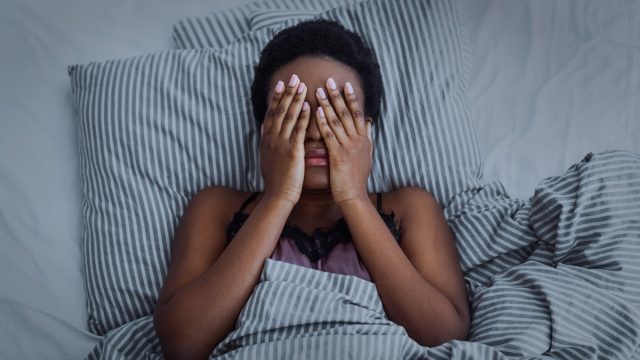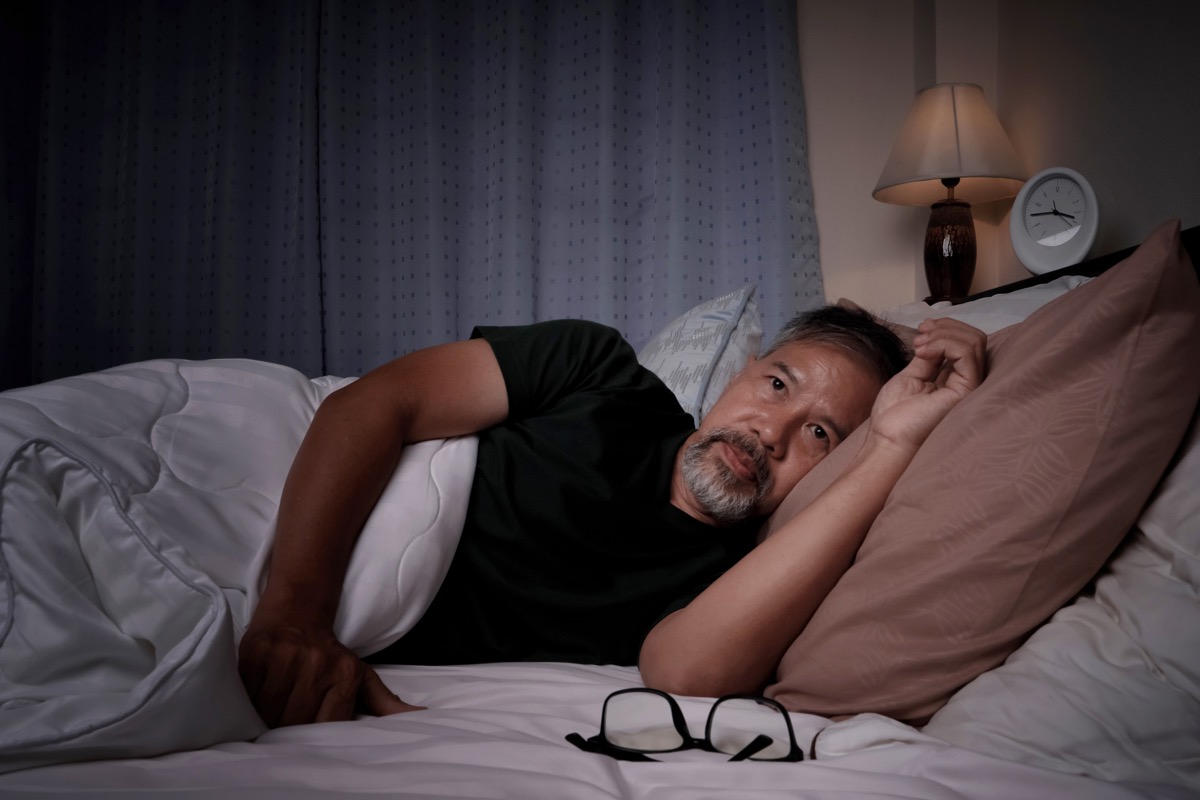7 Reasons You Keep Waking Up at Night, According to Doctors

If you tend to drift off to sleep without issue only to wake up in the middle of the night, you’re not alone. According to a 2010 study in the Journal of Psychosomatic Research, roughly one third of over 2,000 people surveyed reported waking up at least three nights per week.
While sleep disturbances only rarely indicate a serious underlying problem, they can leave you feeling exhausted and ultimately take a toll on both your mental and physical health.
If you’re looking to conquer your sleep problems, doctors say the first step is to identify any factors which could be causing them. Read on to learn seven common reasons you could be waking up at night—how to address them.
READ THIS NEXT: If You Sleep in This Position, You Could Be Hurting Your Spine, Experts Warn.
1
You have a chronic health condition.

If you find yourself waking up throughout the night, a wide range of underlying health conditions could be to blame. “Medical conditions such as chronic pain, acid reflux, and heart disease can all interfere with sleep and cause frequent awakenings throughout the night,” says Warisha Fathima, MBBS, an in-house physician at Allo Health.
She adds that sleep apnea and restless leg syndrome are two common underlying conditions which can directly interrupt your sleep. “Sleep apnea is a condition that causes breathing to repeatedly stop and start during sleep, leading to poor sleep quality and frequent awakenings throughout the night,” she tells Best Life. “Restless leg syndrome is a neurological disorder that causes uncomfortable sensations in the legs, making it difficult to fall asleep and stay asleep.”
Talk to your doctor about your symptoms to determine whether a chronic health condition could be to blame.
READ THIS NEXT: I’m a Pharmacist, and This Is the Sleep Aid I Recommend.
2
You’re experiencing medication side effects.

When you speak with your doctor about your sleep concerns, be sure to discuss any medications you’re taking which could be causing night wakings. “Certain medications, such as antidepressants and blood pressure medications, can cause sleep disturbances as a side effect,” explains Fathima.
According to the American Association of Retired Persons (AARP), those are just the tip of the iceberg. They point out that alpha-blockers, beta-blockers, corticosteroids, statins, and a wide range of other medications have been linked to insomnia.
3
You suffer from anxiety or depression.

Just as your physical health can make it difficult to fall asleep or stay asleep, so can your mental health. “Anxiety and depression can both contribute to sleep disturbances. Anxiety can cause racing thoughts and an inability to relax, while depression can lead to difficulty falling asleep and early morning awakenings,” says Fathima.
According to the Sleep Foundation, depression and sleep problems have a bidirectional relationship. “This means that poor sleep can contribute to the development of depression and having depression makes a person more likely to experience sleep troubles,” their experts write, adding that this can make it difficult to know which of the two issues started the cycle.
By speaking with a licensed mental health professional and treating your depression or anxiety with therapy or medication, you may see improvements in your sleep patterns.
4
Your drinking habits are affecting your sleep.

Though a nightcap may help you slip off to sleep with ease, it may also be responsible for waking you up at night. “You pay for it in the second half of the night,” Jennifer Martin, PhD, a psychologist and professor of medicine at the University of California, Los Angeles, told The New York Times in 2022. She added that alcohol is “initially sedating, but as it’s metabolized, it’s very activating.”
That’s because as your body initially processes alcohol, it tamps down the impulses between nerve cells, allowing you to sleep deeply. However, once the alcohol has been fully processed, many people experience “rebound arousal.” This can ultimately lead to more vivid dreams, increased restlessness, and fragmented sleep.
5
You have poor sleep hygiene.

If you keep waking up at night, it may be due to your bedtime habits earlier in the night. “Poor sleep habits, such as using electronic devices before bed, irregular sleep schedules, and sleeping in a noisy or uncomfortable environment, can all contribute to sleep disturbances,” Fathima tells Best Life.
For more health news sent directly to your inbox, sign up for our daily newsletter.
6
You’re having caffeine too late in the day.

Whether from coffee, tea, chocolate, or soft drinks, your caffeine habit could also be keeping you up at night—especially if you have it too late in the day. “Caffeine is a stimulant that can interfere with sleep,” explains Fathima. “Consuming caffeine too close to bedtime can make it difficult to fall asleep and stay asleep,” she adds.
Experts say that caffeine can take up to five hours for your body to process, meaning you should make cut yourself off that long before your desired bedtime.
7
Your diet is disrupting your sleep.

Your diet can have a profound impact on your general health, and on your sleep in particular. Fathima says there are several mistakes you may be making at mealtime that could account for your frequent night wakings.
For example, she points out that eating spicy foods can cause heartburn and indigestion, which can wake you up with a feeling of discomfort. Eating foods that are packed with sugar can also cause sleep disturbances, she says. “Consuming sugary foods and drinks before bed can cause a spike in blood sugar levels, which can disrupt sleep. This is because the body releases insulin to regulate blood sugar, which can interfere with the body’s natural sleep process,” she notes.
Finally, keeping an eye on your portion sizes in the evening could help you catch more Zzzs, since digesting heavy meals “requires energy and can cause discomfort, which can make it difficult to fall asleep and stay asleep.” By making thoughtful choices—at mealtime and throughout the day—you may finally enjoy a better night’s rest.
Best Life offers the most up-to-date information from top experts, new research, and health agencies, but our content is not meant to be a substitute for professional guidance. When it comes to the medication you’re taking or any other health questions you have, always consult your healthcare provider directly.